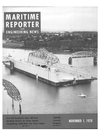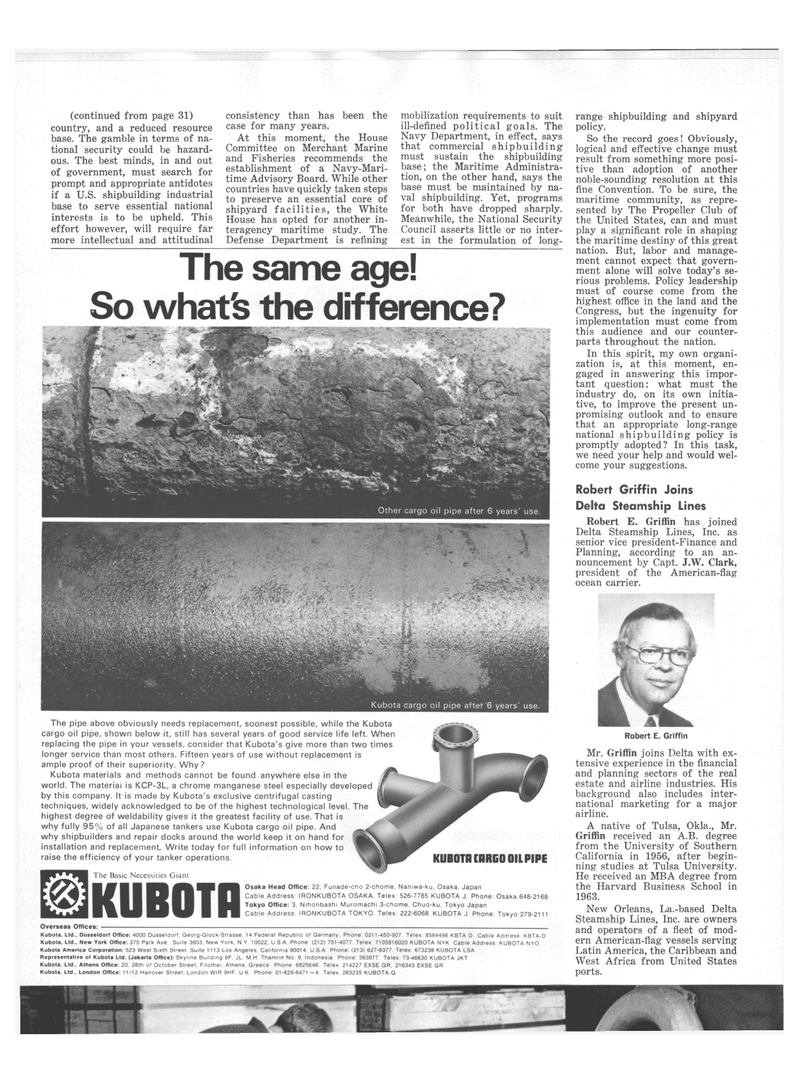
Page 32: of Maritime Reporter Magazine (November 1978)
Read this page in Pdf, Flash or Html5 edition of November 1978 Maritime Reporter Magazine
(continued from page 31) country, and a reduced resource base. The gamble in terms of na- tional security could be hazard- ous. The best minds, in and out of government, must search for prompt and appropriate antidotes if a U.S. shipbuilding industrial base to serve essential national interests is to be upheld. This effort however, will require far more intellectual and attitudinal consistency than has been the case for many years.
At this moment, the House
Committee on Merchant Marine and Fisheries recommends the establishment of a Navy-Mari- time Advisory Board. While other countries have quickly taken steps to preserve an essential core of shipyard facilities, the White
House has opted for another in- teragency maritime study. The
Defense Department is refining mobilization requirements to suit ill-defined political goals. The
Navy Department, in effect, says that commercial shipbuilding must sustain the shipbuilding base; the Maritime Administra- tion, on the other hand, says the base must be maintained by na- val shipbuilding. Yet, programs for both have dropped sharply.
Meanwhile, the National Security
Council asserts little or no inter- est in the formulation of long- range shipbuilding and shipyard policy.
So the record goes! Obviously, logical and effective change must result from something more posi- tive than adoption of another noble-sounding resolution at this fine Convention. To be sure, the maritime community, as repre- sented by The Propeller Club of the United States, can and must play a significant role in shaping the maritime destiny of this great nation. But, labor and manage- ment cannot expect that govern- ment alone will solve today's se- rious problems. Policy leadership must of course come from the highest office in the land and the
Congress, but the ingenuity for implementation must come from this audience and our counter- parts throughout the nation.
In this spirit, my own organi- zation is, at this moment, en- gaged in answering this impor- tant question: what must the industry do, on its own initia- tive, to improve the present un- promising outlook and to ensure that an appropriate long-range national shipbuilding policy is promptly adopted? In this task, we need your help and would wel- come your suggestions.
Robert Griffin Joins
Delta Steamship Lines
Robert E. Griffin has joined
Delta Steamship Lines, Inc. as senior vice president-Finance and
Planning, according to an an- nouncement by Capt. J.W. Clark, president of the American-flag ocean carrier.
Robert E. Griffin
Mr. Griffin joins Delta with ex- tensive experience in the financial and planning sectors of the real estate and airline industries. His background also includes inter- national marketing for a major airline.
A native of Tulsa, Okla., Mr.
Griffin received an A.B. degree from the University of Southern
California in 1956, after begin- ning studies at Tulsa University.
He received an MBA degree from the Harvard Business School in 1963.
New Orleans, La.-based Delta
Steamship Lines, Inc. are owners and operators of a fleet of mod- ern American-flag vessels serving
Latin America, the Caribbean and
West Africa from United States ports.
The same age!
So what's the difference? mgmmtm < -srw . -' • .'"*• •». * .*
K& i i • - ; ~ ' • ^ ate?•*> • ^
V.
Other cargo oil pipe after 6 years' use.
The pipe above obviously needs replacement, soonest possible, while the Kubota cargo oil pipe, shown below it, still has several years of good service life left. When replacing the pipe in your vessels, consider that Kubota's give more than two times longer service than most others. Fifteen years of use without replacement is ample proof of their superiority. Why?
Kubota materials and methods cannot be found anywhere else in the world. The material is KCP-3L, a chrome manganese steel especially developed by this company. It is made by Kubota's exclusive centrifugal casting techniques, widely acknowledged to be of the highest technological level. The highest degree of weldability gives it the greatest facility of use. That is why fully 95% of all Japanese tankers use Kubota cargo oil pipe. And why shipbuilders and repair docks around the world keep it on hand for installation and replacement Write today for full information on how to raise the efficiency of your tanker operations.
The Basic Necessities Giant
KUBOTHIHRCO OILPIPE
Osaka Head Office: 22. Funade-cho 2-chome, Naniwa-ku. Osaka. Japan
Cable Address IRONKUBOTA OSAKA Telex: 526-7785 KUBOTA J. Phone: Osaka 648-2168
Tokyo Office: 3. Nihonbashi Muromachi 3-chome. Chuo-ku, Tokyo Japan
Cable Address IRONKUBOTA TOKYO Telex: 222-6068 KUBOTA J. Phone Tokyo 279-2111
Kubota, Ltd., Diisseldorf Office: 4000 Dusseldort. Georg-Glock-Strasse. 14 Federal Republic of Germany. Phone 0211-450-907. Telex: 8584498 KBTA D Cable Address KBTA-D
Kubota, Ltd., New York Office: 375 Park Ave.. Suite 3603. New York. N Y. 10022. U.S.A. Phone (212) 751-4077 Telex: 7105816020 KUBOTA NYK Cable Address KUBOTA NYO
Kubota America Corporation: 523 West Sixth Street. Suite 1113. Los Angeles. California 90014. U S A Phone: (2131 627-6377. Telex: 673238 KUBOTA LSA
Representative of Kubota Ltd. (Jakarta Office): Skyline Building 8F, JL M H Thamrin No 9. Indonesia. Phone 363977. Telex 73-46630 KUBOTA JKT
Kubota. Ltd.. Athens Office: 20. 28th of October Street. Filothei, Athens, Greece Phone 6825646 Telex 214227 EXSE GR. 216343 EXSE GR
Kubota. Ltd.. London Office: 11/12 Hanover Street. London WIR 9HF. U K Phone 01-629-6471 ~4 Telex. 263235 KUBOTA G
Overseas Offices: -

 31
31

 33
33
